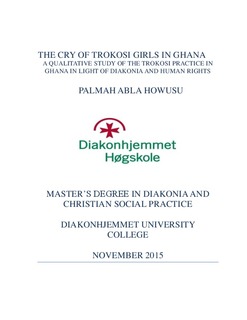| dc.description.abstract | Children especially girls are under different types of oppression in Sub-Saharan Africa due
to various practices, belief systems, values, and laws. In Ghana, one practice that seems to
subjugate women and girls in particular is the troxorvi system. Troxorvi or trokosi is a
practice that involves the acceptance of human being especially virgin girls for the
atonement of real or alleged misconduct of a family member. The committed girl stays in
the shrine as a “slave” and owes allegiance to the deity for the rest of her life. However,
contemporary societies frown upon and make laws to eradicate any form of slavery due to
its human right abuses. In 1998, Ghana amended her laws prohibiting the troxorvi practice
as well as committing herself to human rights values by signing most of the international
laws on human rights including those on children and women. After a decade of
promulgation of the Law against the troxorvi practice, not even a single culprit has been
arrested. The study explores the human rights abuses within the troxorvi system and efforts
by diaconal actors. It further explores how diakonia could be employed as a
multidimensional approach towards eradication of the troxorvi practice in Ghana. | nb_NO |
